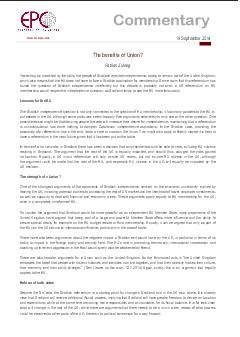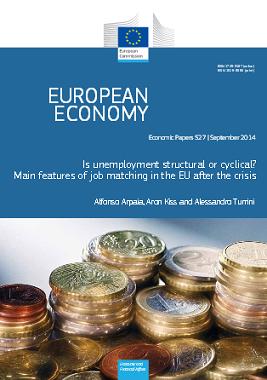Zartaloudis, S. (2014) “The financial crisis has badly damaged the Greek and Portuguese welfare states“, LSE EUROPP, 23 Σεπτεμβρίου. Several European states have pursued austerity policies in the aftermath of the financial crisis, but how have these policies affected welfare states? Sotirios Zartaloudis writes on the impact of the crisis in Greece and Portugal. He argues that both countries have had to pursue unprecedented spending cuts, tax rises and …Read More
Dying for Europe
Sutherland, P. (2014) “Dying for Europe“, Project Syndicate, 19 Σεπτεμβρίου. This summer, a gruesome tragedy unfolded aboard a ship in the Mediterranean Sea. Twenty-nine men, women, and children fleeing crisis-torn countries succumbed to engine fumes in the vessel’s hold. As 60 others scrambled to escape, the human traffickers carrying them to Europe stabbed them and threw them into the sea off the coast of Lampedusa. Eventually, a Danish petrol …Read More
Europe’s Single Supervisory Mechanism: Most small banks are German (and Austrian and Italian) – a closer look at the ECB’s list shows that the smaller banks are concentrated in a limited number of countries, much more so than larger ones
Véron, Ν. (2014) “Europe’s Single Supervisory Mechanism: Most small banks are German (and Austrian and Italian) – a closer look at the ECB’s list shows that the smaller banks are concentrated in a limited number of countries, much more so than larger ones“, Bruegel Think Tank, 22 Σεπτεμβρίου. A well-known limitation of Europe’s banking union is the fact that most banks in the euro area will escape direct supervision …Read More
Is the peace narrative really obsolete?
Sonntag, Α. (2014) “Is the peace narrative really obsolete?“, EU-Asia Institute, ESSCA School of Management, 22 Σεπτεμβρίου. Efforts such as Rethinking Economics and The Institute for New Economic Thinking are noteworthy attempts to, as INET says, “broaden and accelerate the development of new economic thinking that can lead to solutions for the great challenges of the 21st century. The havoc wrought by our recent global financial crisis has vividly …Read More
Can New Economic Thinking Solve the Next Crisis?
Thoma, M. (2014) “Can New Economic Thinking Solve the Next Crisis?“, The Fiscal Times, 16 Σεπτεμβρίου. Efforts such as Rethinking Economics and The Institute for New Economic Thinking are noteworthy attempts to, as INET says, “broaden and accelerate the development of new economic thinking that can lead to solutions for the great challenges of the 21st century. The havoc wrought by our recent global financial crisis has vividly demonstrated …Read More
The absence of national adjustment tools is the reason why Eurozone countries continue to struggle
Johnston, A. & Regan, A. (2014) “The absence of national adjustment tools is the reason why Eurozone countries continue to struggle“, LSE EUROPP, 22 Σεπτεμβρίου. The Eurozone continues to experience low growth, while unemployment remains a substantial problem in several European states. Alison Johnston and Aidan Regan write that despite these issues, the European policy response has remained broadly similar since the crisis: reducing public spending and imposing structural …Read More
The benefits of Union?
Zuleeg, F. (2014) “The benefits of Union?“, Commentary, EPC Publications, 19 Σεπτεμβρίου. Yesterday, as predicted by the polls, the people of Scotland rejected independence, opting to remain part of the United Kingdom, which also means that the EU does not have to face a Scottish application for membership. Some claim that this referendum has buried the question of Scottish independence indefinitely but this debate is probably not over: a …Read More
T.L.T.R.O. is Too Low to Resuscitate Optimism – the take up of liquidity under the ECB’s new TLTRO programme was well below expectations yesterday
Merler, S. (2014) “T.L.T.R.O. is Too Low to Resuscitate Optimism – the take up of liquidity under the ECB’s new TLTRO programme was well below expectations yesterday“, Bruegel Institute, 19 Σεπτεμβρίου. Yesterday the ECB held the first auction of liquidity under its new TLTRO programme. The take up was well below expectations, raising questions about the actual ability of the ECB to regain control of its balance sheet. It’s …Read More
Is unemployment structural or cyclical? Main features of job matching in the EU after the crisis
Arpaia, Α., Kiss, A. & Turrini, A. (2014) “Is unemployment structural or cyclical? Main features of job matching in the EU after the crisis“, European Economy, European Commission Economic Papers 527, Σεπτέμβριος. The paper sheds light on developments in labour market matching in the EU after the crisis. First, it analyses the main features of the Beveridge curve and frictional unemployment in EU countries, with a view to isolate …Read More
European Employment Strategy – barely a new job in sight
Mitchell, B. (2014) “European Employment Strategy – barely a new job in sight“, Bill Mitchell Blog-Modern Monetary Theory … macroeconomic reality, 17 Σεπτεμβρίου. Eurostat released the latest – Employment – data for July 2014 last week (September 12, 2014) and announced that total employment was up by 0.2 per cent in the euro area. For those that study the data closely you will not be confused. But for the …Read More






